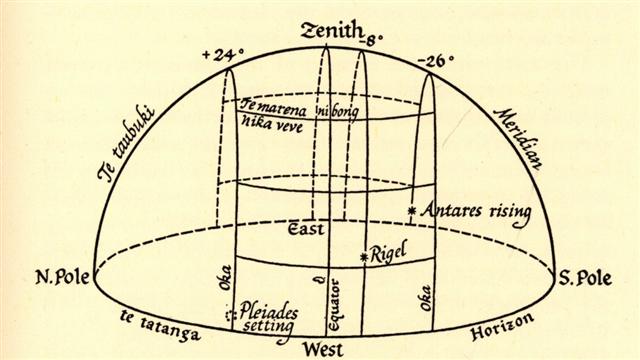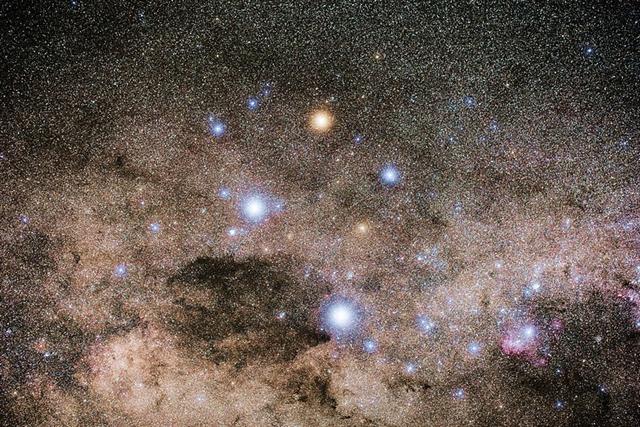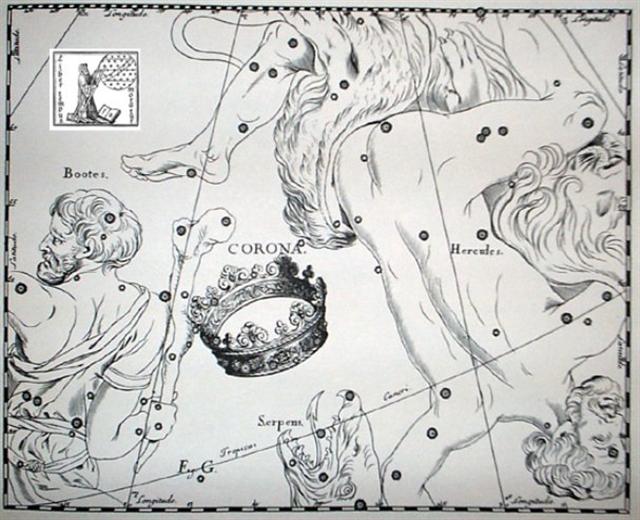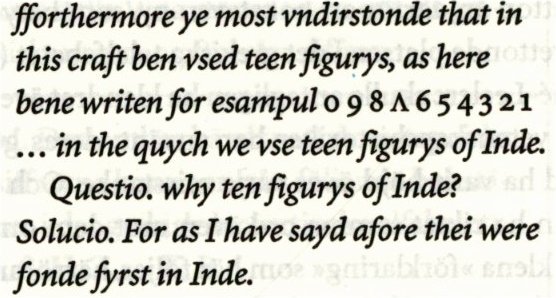The place in time-space was the Pleiades -
where a good time for saling was ahead:
... another Alcyone,
daughter of Pleione, 'Queen of Sailing', by
the oak-hero Atlas, was the mystical leader
of the seven Pleiads. The heliacal rising of
the Pleiads in May marked the beginning of
the navigational year; their setting marked
its end when (as Pliny notices in a passage
about the halcyon) a remarkably cold North
wind blows ...
This was in May because it was north of the
equator, whereas in Polynesia (basically
south of the equator) the Pleiades at the
Full Moon corresponded to May + 6 months =
November. The six stars in the Pleiades (Tau-ono)
marked where the transition occurred.

... The correspondence
between the winter solstice and the
kali'i rite of the Makahiki is
arrived at as follows: ideally, the second
ceremony of 'breaking the coconut', when the
priests assemble at the temple to spot the
rising of the Pleiades, coincides with the
full moon (Hua tapu) of the twelfth
lunar month (Welehu). In the latter
eighteenth century, the Pleiades appear at
sunset on 18 November. Ten days later (28
November), the Lono effigy sets off
on its circuit, which lasts twenty-three
days, thus bringing the god back for the
climactic battle with the king on 21
December, the solstice (= Hawaiian 16
Makali'i). The correspondence is 'ideal'
and only rarely achieved, since it depends
on the coincidence of the full moon and the
crepuscular rising of the Pleiades
...
Antares rose with the Sun in November 25
(329) and Alcyone in the Pleiades in May 16
(136). After counting half a year ahead (136
+ 183 = 319) the remaining distance to
Antares was 10 days - which suggests the
ship with the Lono effigy was
launched in coordination with Antares.
At right in the upper panel we can see the
ship (the God Boat) sailing away and we can count to 6 at
its stern. Then followed a special 7 looking like
Φ (phi
as in the Golden Mean).
... Fibonacci:
1, 1, 2, 3, 5, 8, 13, 21, 34, 55 ... →
1.618033998 ... = φ = (1 + √5) / 2 ...
And then the Mesopotamian series continued with 10
more of the
same. Possibly the Bird
above could illustrate the Spirit of the Pleiades.
We could count
for
instance: (6 + 10) *
21½ = 8 * 43 = 344 = 360 - 16.
The Sea Journey
could therefore have taken 43 days, for 344 - 43 = 295 + 6.
... Hotu's canoe
sailed from Maori to Te Pito O Te
Kainga. It sailed on the second day of
September (hora nui) ... [E:74]
... The canoes of Ava
Rei Pua and of Hotu were seen
near the (off-shore) islets. On the
fifteenth day of the month of October (tangaroa
uri) the canoe of Hotu and the
canoe of Ava Rei Pua landed ... [E:75]
288 (Tangaroa
Uri 15) - Hora Nui 2 (245) = 43.
At right in the
lower panel of the Mesopotamian overview we can see
a ziggurath built
by mud bricks. 8 + 7 + 5 + 4 = 24.
|
 |
 |
 |
 |
 |
|
Ga7-1 |
Ga7-2 |
Ga7-3 |
Ga7-4 |
Ga7-5 |
|
CLOSE TO THE FULL
MOON: |
|
MARCH 9 (68) |
10 |
11 (*355) |
12 |
13 (254 - 182) |
|
No star listed (52) |
ψ
Persei (53.1)
ACRUX (α
CRUCIS)
(235
+ 183 - 365 = 53) |
δ Persei (54.7) |
Al Thurayya-27 (Many Little
Ones) /
Krittikā-3 (Nurses of
Kārttikeya) /
TAU-ONO (Six Stones)
ATIKS =
ο
Persei, RANA (Frog) =
δ
Eridani (55.1),
CELAENO (16 Tauri), ELECTRA
(17), TAYGETA (19),
ν
Persei (55.3), MAIA (20),
ASTEROPE (21), MEROPE (23)
(55.6) |
Hairy Head-18 (Cockerel) /
Temennu-3 (Foundation Stone)
ALCYONE
(56.1),
PLEIONE (28 Tauri), ATLAS (27
Tauri)
(56.3) |
 |
|
May 12 (132) |
13 (*53) |
14 |
15 (500, erima te rau) |
16 (136) |
|
... During
the reign of Matua, the Hanau
Eepe came [he ea]. They
stole [he toke]
one side (etahi painga)
of the land of he king of Hanau
Momoko and moved [he hakaneke]
the border [te tita'a koîa]
from their side toward the side
of the Hanau Momoko. Five
hundred [erima te rau]
Hanau Eepe stole the land of the
king of the Hanau Momoko.
[E:53].
... 'Oh, you,
why [mo-te-aha] have you
violated [toke] the
borders of my [tooku]
land?' The Hanau Eepe answered,
'There is not enough land [he
kainga kore] to live on!'
Thereupon the king called out [he
rangi] to the Hanau Eepe,
'Here I stand, and I tell all of
you: I am taking [he too au]
you prisoners [he puru]
and I am locking you up in the
house of prisoners (hare kopu)
for fifty [50, erima te
kauatu] years!' Then the
king called out [he rangi]
to his men, 'Seize [ka too]
all of them, and lock up all of
the Hanau Eepe! Lock them up [ka
puru] for good!' [E:55 →
right ascension day
corresponding to May 15 (365 +
135 = 500)].
... Matua
[A Taana] said to Hotu
[A Matua], 'Take along
the Hanau Eepe and let
them work the land!' Hotu
called out to Heke: 'Go
and bring the 500 prisoners on
board the canoe!' He took all of
them along, led them on board
the canoe, and left them there.
For six days (po ono),
mats (moenga) were taken
on board the canoe (i.e., the
loading of the canoe took six
days) ... [E:73-74
→
Ga7-3--7-4.] |
|
E:73 → 584 / 8 = 365 / 5 → 40
(February 9) + 33 (→ Mira)
... On
February 9 the Chorti Ah K'in,
'diviners', begin the
agricultural year. Both the
260-day cycle and the solar year
are used in setting dates for
religious and agricultural
ceremonies, especially when
those rituals fall at the same
time in both calendars. The
ceremony begins when the
diviners go to a sacred spring
where they choose five stones
with the proper shape and color.
These stones will mark the five
positions of the sacred
cosmogram created by the ritual.
When the stones are brought back
to the ceremonial house, two
diviners start the ritual by
placing the stones on a table in
a careful pattern that
reproduces the schematic of the
universe. At the same time,
helpers under the table replace
last year's diagram with the new
one. They believe that by
placing the cosmic diagram under
the base of God at the center of
the world they demonstrate that
God dominates the universe. The
priests place the stones in a
very particular order. First the
stone that corresponds to the
sun in the eastern, sunrise
position of summer solstice is
set down; then the stone
corresponding to the western,
sunset position of the same
solstice. This is followed by
stones representing the western,
sunset position of the winter
solstice, then its eastern,
sunrise position. Together these
four stones form a square. They
sit at the four corners of the
square just as we saw in the
Creation story from the Classic
period and in the Popol Vuh.
Finally, the center stone is
placed to form the ancient
five-point sign modern
researchers called the quincunx
...
 |
|
CLOSE TO THE SUN: |
|
SEPT 7 (250) |
8 |
9 (70 + 183) |
10 (135 + 4 * 29½) |
11 |
|
NUSAKAN (Pauper's Bowl) = β Cor.
Bor.
(234.0), κ¹ Apodis (234.3), ν
Bootis (234.7), ζ Librae (234.9) |
θ Cor. Borealis (235.3), γ Lupi
(235.6),
GEMMA = α Cor. Bor., ZUBEN
ELAKRAB = γ Librae, QIN = δ
Serpentis, ε Tr. Austr.
(235.7), μ Cor. Borealis
(235.8), υ Librae (235.9)
SIRRAH (α Andromedae)
(53 + 182 = 235) |
φ Bootis (236.2), ω Lupi, τ
Librae (236.3), ψ¹ Lupi (236.7),
ζ Cor. Borealis (236.9) |
κ
Librae (237.2),
ι Serpentis (237.4),
ψ²
Lupi,
ρ
Oct.
(237.5), γ Cor. Borealis, η
Librae (237.7),
COR SERPENTIS = α Serpentis
(237.9)
*196.0 = *237.4 - *41.4 |
π
Cor. Borealis,
UNUK ELHAIA (Necks of the
Serpents) =
λ
Serpentis
(238.1),
CHOW =
β
Serpentis
(238.6) |
|
Nov 10 (314 → π) |
11 |
12 (*236 = 8 * 29½) |
13 |
14 |
|
... In other words, the ancient
Druidic religion based on the
oak-cult will be swept away by
Christianity and the door - the
god Llyr - will languish
forgotten in the Castle of
Arianrhod, the Corona
Borealis. This helps us to
understand the relationship at
Rome of Janus and the White
Goddess Cardea who is ... the
Goddess of Hinges who came to
Rome from Alba Longa. She was
the hinge on which the year
swung - the ancient Latin, not
the Etruscan year - and her
importance as such is recorded
in the Latin adjective
cardinalis - as we say in
English 'of cardinal importance
- which was also applied to the
four main winds; for winds were
considered as under the sole
direction of the Great Goddess
until Classical times ...
 |
|
SEPT 12 |
13 (256 = 16 * 16 = 240 + 16) |
14 (*177) |
 |
 |
 |
|
Ga7-6 |
Ga7-7 |
Ga7-8 (177 = 6 * 29½) |
|
CLOSE TO THE SUN: |
|
κ
Serpentis (239.3),
δ
Cor. Borealis,
TIĀNRŪ = μ Serpentis
(239.5),
χ
Lupi, (239.6),
ω
Serpentis (239.7),
BA = ε Serpentis,
χ
Herculis (239.8).
κ
Cor.
Borealis, ρ Serpentis (239.9) |
λ Librae
(240.0), β
Tr. Austr. (240.3),
κ
Tr. Austr. (240.4),
ρ
Scorpii (240.8)
*199.0 = *240.4 - *41.4 |
Iklīl al Jabhah-15 (Crown of the
Forehead) /
Anuradha-17 (Following Rādhā) /
Room-4 (Hare)
ξ
Lupi,
λ
Cor. Bor.(241.1),
ZHENG =
γ
Serpentis,
θ
Librae (241.2),
VRISCHIKA = π Scorpii
(241.3),
ε
Cor.
Borealis (241.5),
DSCHUBBA
(Front of Forehead) = δ Scorpii
(241.7), η Lupi (241.9) |
|
Nov 15 |
16 (320) |
17 |
|
°Nov 11 |
12 (*236 = 8 * 29½) |
13 |
|
'Oct 19 |
20 |
21 (*214) |
|
"Oct 5 |
6 (*199) |
7 (280) |
 |
|
CLOSE TO THE FULL
MOON: |
|
3-14 (73) |
MARCH 15 → E:74 |
16 (*360) |
|
... Hotu's
canoe sailed from Maori
to Te Pito O Te Kainga.
It sailed on the second day of
September (hora nui) ...
[E:74] |
|
MENKHIB (Next to the Pleiades =
ζ Persei
(57.6)
PORRIMA (γ Virginis) |
ZAURAK (Boat) = γ Eridani
(58.9) |
λ Tauri (59.3), ν Tauri (59.9) |
|
May 17 |
18 |
19 |
|
°May 13 |
14 |
15 (500 = 365 + 135) |
|
'April 20 |
21 (111) |
22 (*32) |
|
"April 6 |
7 |
8 (*383) |
 |

|
.jpg)









